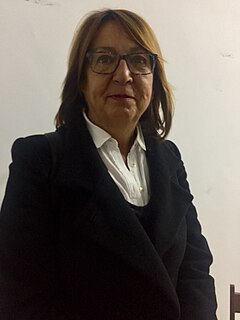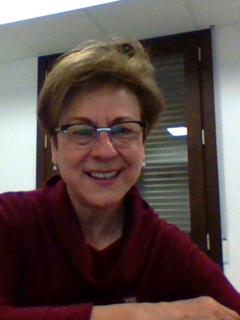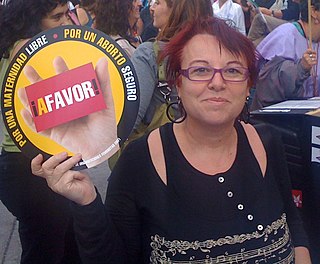Alicia Girón González is the past president of the International Association for Feminist Economics (IAFFE), her tenure was 2014 to 2015. Girón has also served as director of Universidad Nacional Autónoma de México's (UNAM) Economic Research Institute (IIEc).

Marta Lamas Encabo is a Mexican anthropologist and political science professor at the National Autonomous University of Mexico (UNAM), and lecturer at the Instituto Tecnológico Autónomo de México (ITAM). She is one of Mexico's leading feminists and has written many books aimed at reducing discrimination by opening public discourse on feminism, gender, prostitution and abortion. Since 1990, Lamas has edited one of Latin America's most important feminist journals, Debate Feminista. In 2005, she was nominated for a Nobel Peace Prize.

Ximena Bedregal Sáez is a Chilean-Bolivian architect, writer, theoretician, professor, editor, photographer, and feminist lesbian. In Mexico, she founded Centro de Investigación, Capacitación y Apoyo a la Mujer, and edited its magazine, La Correa Feminista.

María Julieta Kirkwood Bañados was a Chilean sociologist, political scientist, university professor and feminist activist. She is considered one of the founders and impellers of the Chilean feminist movement in the 1980s. She is considered the forerunner of Gender studies in Chile.
Rosa Inés Curiel Pichardo, better known as Ochy Curiel, is an Afro-Dominican lesbian, feminist academic, singer and social anthropologist. She is known for helping to establish the Afro-Caribbean women's movement and maintaining that lesbianism is neither an identity, orientation nor sexual preference, but rather a political position. She is one of the most prominent feminist scholars in Latin America and the Caribbean.

Ana Irma Rivera Lassén is an Afro-Puerto Rican attorney who is a current Member of the Puerto Rican Senate, elected on November 3, 2020, and who previously served as the head of the Bar Association of Puerto Rico from 2012–2014. She was the first black woman, and third female, to head the organization. She is a feminist and human rights activist, who is also openly lesbian. She has received many awards and honors for her work in the area of women's rights and human rights, including the Capetillo-Roqué Medal from the Puerto Rican Senate, the Martin Luther King/Arturo Alfonso Schomburg Prize, and the Nilita Vientós Gastón Medal. She is a practicing attorney and serves on the faculty of several universities in Puerto Rico; she currently serves on the Advisory Committee on Access to Justice of the Puerto Rican Judicial Branch.

Rocio de la Villa is a Spanish university professor, art historian, curator, researcher and art critic. She has edited and collaborated in the edition of distinct catalogues and publications related with the art and the position of the woman in the artistic world. In 2014 she was rewarded with the Prize MAV in the modality of Criticism of art. She also goes by the names Rocio de la Villa Ardura and Rocio Villa-Ardura.

Celia Amorós Puente is a Spanish philosopher, essayist and supporter of feminist theory. She is a key figure in the so-called equality feminism and focused an important part of her research in the building of relations between Enlightenment and feminism. Her book Hacia una crítica de la razón patriarcal constitutes a new outlook on the gender perspective of philosophy, revealing the biases of androcentrism and claims a critical review on behalf of women.

Marian Lopez Fernandez-Cao is a Spanish university professor, curator and researcher, specializing in art, feminism, art therapy and social inclusion. Since 1992 she has been a professor in the Universidad Complutense of Madrid, and is expert on the artist Sonia Delaunay.
Consuelo González Ramos was a Spanish journalist, nurse, and feminist.

Cándida Martínez López is a Spanish historian, university professor, expert in women's history and studies, and politician. From 2000 to 2008 she was Councilor of Education of the Regional Government of Andalusia, and from 2008 to 2011 a deputy of the 9th Legislature of Spain. She is co-director of Arenal, Journal of Women's History.

Montserrat Boix Piqué is a Spanish journalist, considered among the most influential women in her country. In early 2000, she created and developed the concepts of social cyberfeminism, and a year later those of feminist hacktivism. Another of her main areas of work is gender violence and communication. She has also stood out as a defender of the right to communication and citizenship rights for women. Since 1986, she has been a journalist for the Information Services of Televisión Española (TVE), in the international section.

Ana de Miguel Álvarez is a Spanish philosopher and feminist. Since 2005 she has been a titular professor of Moral and Political Philosophy at King Juan Carlos University of Madrid. She directs the course History of Feminist Theory at the Complutense University of Madrid's Instituto de Investigaciones Feministas.
Ana Victoria Jiménez is a Mexican feminist, photographer, editor, and activist, that actively participated in the second wave of Mexico's feminist movement. She is best known for her archive, Archivo Ana Victoria Jiménez, which contains photographs, posters, and flyers that demonstrated or related to women activism in Mexico.

Alicia Helda Puleo García is an Argentine-born feminist philosopher based in Spain. She is known for the development of ecofeminist thinking. Among her main publications is Ecofeminismo para otro mundo posible.
Margarita M. Birriel Salcedo is a tenured professor in the Department of Modern and American History at the Faculty of Philosophy and Letters of the University of Granada. She is an expert in women's history and women's studies.

Rosa Cobo Bedía is a Spanish feminist, writer, and professor of sociology of gender at the University of A Coruña. She is also the director of the Center for Gender Studies and Feminists at the same university. Her main line of research is feminist theory and the sociology of gender.
Tlacuilas y Retrateras was one of the first feminist art collectives in Mexico, it was founded in May 1983 by Ruth Albores, Consuelo Almeda, Karen Cordero, Ana Victoria Jiménez, Lorena Loaiza, Nicola Coleby, Marcela Ramírez, Isabel Restrepo, Patricia Torres and Elizabeth Valenzuela based on a feminist art workshop taught by Mónica Mayer at the Academia de San Carlos, National School of Plastic Arts (UNAM).

Eli Bartra is a feminist philosopher and a pioneer in researching women and folk art in different places of the world, but particularly, in Mexico. She is the daughter of the writers Anna Murià and Agustí Bartra, two Catalan refugees in Mexico.

Raquel Ramírez Salgado is a Mexican researcher, communicator, feminist and women's rights activist.














